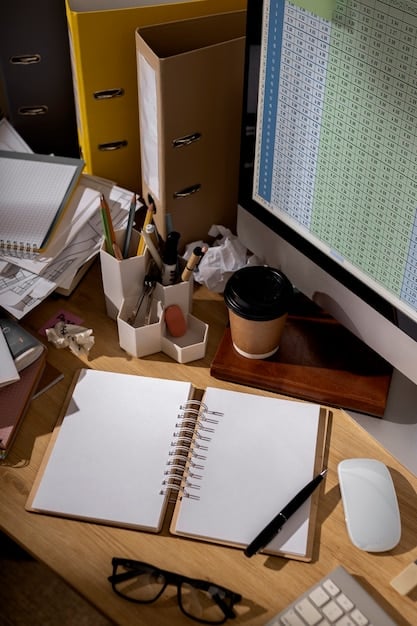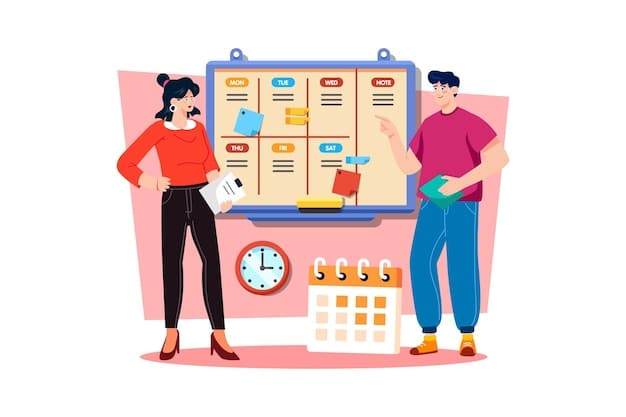Declutter Your Mind: 5 Simple Strategies for Clarity

Decluttering your mind involves employing simple yet effective strategies like mindfulness, journaling, prioritizing tasks, creating a serene environment, and practicing gratitude to alleviate mental clutter and promote enhanced clarity and focus.
Feeling overwhelmed? Discover declutter your mind: 5 simple strategies to reduce mental clutter and increase clarity, helping you regain focus and peace.
Understanding Mental Clutter
Mental clutter is the accumulation of overwhelming thoughts, worries, and distractions that cloud your mind. It can lead to stress, anxiety, and a decreased ability to focus.
Recognizing the signs of mental clutter is the first step towards achieving mental clarity. From constant worrying patterns to difficulty concentrating, understanding how mental clutter manifests can pave the way for effective strategies.
Signs of Mental Clutter
- Difficulty concentrating
- Constant worrying
- Feeling overwhelmed
- Trouble making decisions
Mental clutter can significantly impact your daily life, affecting your productivity, relationships, and overall well-being. By implementing effective strategies, you can start to declutter your mind and reclaim your inner peace.

Mindfulness Meditation for a Clearer Mind
Mindfulness meditation is a powerful technique to declutter your mind. It involves focusing on the present moment, acknowledging your thoughts and feelings without judgment.
Practicing mindfulness allows you to observe your thoughts as they arise, rather than getting caught up in them. This creates space between you and your mental clutter, leading to increased clarity and calm.
How to Practice Mindfulness Meditation
- Find a quiet space
- Sit comfortably
- Focus on your breath
- Acknowledge thoughts without judgment
Regular mindfulness meditation can help you develop a greater awareness of your mental processes and reduce the impact of mental clutter. It’s a simple yet profound way to cultivate inner peace.
The Power of Journaling
Journaling is an excellent way to process thoughts and emotions, helping to declutter your mind. Writing down your feelings can provide clarity and insight into your mental clutter.
By regularly journaling, you can track your thoughts, identify patterns, and gain a better understanding of your mental state. Journaling is a therapeutic tool that helps sort through chaotic thoughts and create mental space.
Benefits of Journaling
- Reduces stress
- Improves mental clarity
- Helps process emotions
- Tracks thought patterns
To get started with journaling, simply find a quiet space and write about whatever comes to mind. There’s no right or wrong way to journal, so let your thoughts flow freely.
Prioritizing Tasks and Time Management
Effective task prioritization can significantly reduce mental clutter by organizing your responsibilities and reducing feelings of overwhelm. When you manage your time well, you feel more in control.
Learning to prioritize tasks involves identifying what is most important and focusing on those items first. Effective time management can create a sense of accomplishment and reduce the mental load.
Time Management Techniques
Time management techniques like the Eisenhower Matrix and the Pomodoro Technique are useful tools for improving productivity and focus. Using tools like this will help you focus on what’s important and get tasks done more efficiently.
- Eisenhower Matrix
- Pomodoro Technique
- Time Blocking
By prioritizing tasks and managing your time effectively, you can declutter your mind and create a sense of order in your life.

Creating a Serene Environment
The environment around you can significantly impact your mental state. Creating a serene and organized space can help reduce mental clutter and promote relaxation.
Your physical environment often directly impacts mental well being. A chaotic, messy space can overwhelm you, and add to mental clutter. Creating a well organized calm space can reduce mental clutter and make a big impact.
Tips for Creating a Serene Environment
Declutter your workspace, add plants, use calming colors, and minimize distractions. Making a tidy relaxing space you enjoy will reduce stress and help declutter your mind.
- Declutter workspace
- Add plants
- Use calming colors
- Minimize distractions
A serene environment promotes a sense of calm and tranquility, helping you declutter your mind and focus on what truly matters.
Practicing Gratitude Daily
Gratitude is a powerful tool for shifting your focus from negative thoughts to positive aspects of your life. Practicing gratitude can help declutter your mind by reducing feelings of stress and anxiety.
Focusing on the things you’re grateful for can improve mental health and shift your way of thinking. Gratitude can promote a sense of well being, optimism, and reduce mental clutter.
Ways to Practice Gratitude
Keep a gratitude journal, express appreciation to others, and reflect on positive experiences. Taking the time to acknowledge the good in your life can significantly improve your mental well-being.
- Keep a gratitude journal
- Express appreciation to others
- Reflect on positive experiences
By incorporating gratitude into your daily routine, you can cultivate a more positive mindset, reduce mental clutter, and experience greater peace of mind.
| Key Point | Brief Description |
|---|---|
| 🧘 Mindfulness | Focus on the present moment to reduce overwhelming thoughts. |
| ✍️ Journaling | Write down your thoughts and emotions to gain clarity. |
| ✅ Prioritization | Manage tasks effectively to decrease feelings of overwhelm. |
| 🌿 Serene Environment | Create a calm space to promote relaxation and reduce distraction. |
FAQ
Mental clutter is the overwhelming accumulation of thoughts, worries, and distractions that cloud your mind. It can lead to feelings of stress, anxiety, and reduced focus.
Mindfulness meditation helps by allowing you to focus on the present moment and observe thoughts without judgment. This practice reduces the impact of mental clutter and increases clarity.
Journaling helps process thoughts and emotions by providing a space to write down feelings, track thought patterns, and gain insights into your mental state. This can lead to improved mental clarity.
Prioritizing involves identifying the most important tasks and focusing on those first. Effective time management techniques, like the Eisenhower Matrix, can further reduce mental clutter by organizing your responsibilities.
Simple ways include keeping a gratitude journal, expressing appreciation to others, and reflecting on positive experiences. These practices shift your focus from negative thoughts to the good aspects of your life.
Conclusion
By incorporating these five simple strategies – mindfulness meditation, journaling, prioritizing tasks, creating a serene environment, and practicing gratitude – you can effectively declutter your mind and experience greater mental clarity, reduced stress, and improved overall well-being. Start today and reclaim your inner peace.





